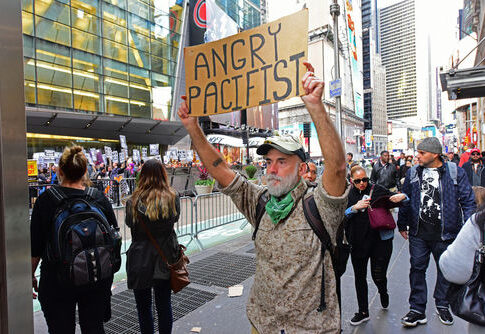What if the cancellation of a late-night TV show could shake the very foundations of our political landscape?
The Curtain Falls on Late-Night TV
Stephen Colbert’s *The Late Show* is coming to an end in May 2026. The announcement hit the airwaves in July 2025, leaving fans and foes alike in a tizzy. CBS attributed the cancellation to financial woes—$40 million in losses annually and a hefty $100 million production bill. Meanwhile, Colbert’s audience, averaging 68 years old, had been shrinking faster than a wool sweater in a hot wash.
https://www.youtube.com/watch?v=AuqEZx6TmfI
Critics and fans can’t help but wonder if the timing is more than coincidental. CBS’s parent company, Paramount Global, is in the throes of a merger with Skydance, owned by David Ellison, a name with Trump ties. The merger needs the green light from the FCC, and speculation is rife that Trump’s long shadow might be influencing these decisions. But before we dive into a conspiracy theory rabbit hole, let’s sift through the facts.
Behind the Scenes of a Television Drama
The late-night landscape is no stranger to shakeups. Remember when Conan O’Brien and Jay Leno had their own dramatic exits? Now, Colbert finds himself in a similar narrative. In a media environment that’s become increasingly fragmented, traditional late-night shows are struggling to stay afloat. Viewership is dwindling, and advertising revenues are drying up like a puddle in the Sahara.
NOW: "CBS Sucks" and "Colbert Stays Trump Go!" Sign at Protests Against Cancelation of Stephen Colbert Late Show in NYC
A protest Monday outside the Ed Sullivan Theater following CBS’s cancellation of The Late Show with Stephen Colbert. The group called the decision… pic.twitter.com/qUBVVHhWLY
— Oliya Scootercaster 🛴 (@ScooterCasterNY) July 21, 2025
Enter the Paramount-Skydance merger. With CBS looking for ways to cut costs, some see the cancellation as a strategic move to save on financial overheads. Yet, the political undertones can’t be ignored. Democratic senators like Adam Schiff and Bernie Sanders have openly speculated about the possible political motives behind the cancellation. But speculation is one thing; evidence is another.
Theories, Theories Everywhere
The idea that Trump, through his influence, might have had a hand in the show’s end is tantalizing. However, there’s a mountain of speculation with only a molehill of evidence. The show’s cancellation aligns with financial realities facing the entire late-night industry. It’s a tough market, and even a high-profile show like Colbert’s isn’t immune to these pressures.
On social media, the theory has spread like wildfire, adding fuel to an already intense political climate. Colbert himself, a staunch critic of Trump, addressed the cancellation as a business decision, yet the timing has left room for interpretation. The conspiracy, while captivating, remains just that—a theory without concrete proof.
The Future of Late-Night TV
As the curtain prepares to fall on Colbert’s tenure, the implications are manifold. The immediate impact? Job losses and the silencing of a platform for political satire. Long-term, the cancellation could accelerate the decline of traditional late-night formats, pushing them further toward extinction. This isn’t just Colbert’s story; it’s a narrative that could echo through the halls of network television for years to come.
VIDEO THREAD: "Colbert stays, Trump must go!" demanded protesters marching to CBS headquarters Monday afternoon to oppose the firing of Stephen Colbert."
"Who will end this fascist nightmare?" they chanted. "We will end this fascist nightmare!" pic.twitter.com/c57iEvHuAA
— Ford Fischer (@FordFischer) July 22, 2025
With the Paramount-Skydance merger hanging in the balance, the outcome could set a precedent for future media consolidations. If political pressure is a factor, it could chill political commentary across mainstream media. The industry may see more cancellations or format changes, especially if financial viability continues to be a concern.
Sources:
https://www.youtube.com/watch?v=AuqEZx6TmfI

